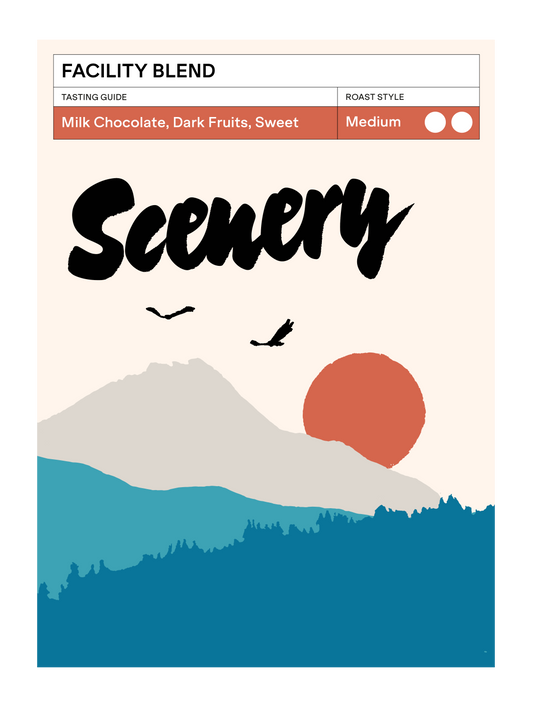This espresso focused release saw us blend two lots from Jonny & Jorge's El Jaragual. This espresso absolutely flew out the door, with a 3 month allocation instead lasting from 15/05/2024 to 26/06/24.
Our second release from El Jaragual - we’ve built this espresso by combining 2 single variety separations. By pairing the complementary characteristics of both the Castillo and Colombia lots, we’re finding a huge amount of sweetness and a distinct lift via modern, higher intervention thermal-shock processing. Perfectly balanced for straight espresso yet punchy enough to hold its own in milk.
Brew Guide:
Best Brewed with: Espresso, Immersion (Aeropress/French Press), Moka pot
We’re taking a modern view to both espresso sourcing and roasting with this lot. Building the desired profile from the two variety seperations, we’re roasting with a touch more development (time in the roaster) - to shave off some acidity and emphasise sweetness and body, whilst also retaining the complexity inherent from the processing.
Best rested for: 2-3 weeks
For Filter: We recommend a ratio of 60-62g/L and 92°C water
For Espresso: 18g in, 40g out, 28-32s for a classic style of espresso.
We’re tasting:
Intensely sweet aromatics of tahitian vanilla, a creamy caramel body & sweetness (like dulce du leche) is lifted by notes of ripe cantaloupe melon, guava and papaya, resulting in a structured and balanced cup. On cool, a spiced apple note
In milk: Melon Jelly and cream soda
Traceability:
Country of Origin: |
Colombia |
Region: |
Amalfi, Antioquia |
Farm: |
Finca El Jaragual |
Producer: |
Jorge Mira and Jonny Martinez |
Variety: |
66% Variedad Colombia, 34% Castillo |
Elevation: |
1500 MASL |
Process: |
Washed / Thermal Shock / Yeast Inoculated: Cherries are then pulped, and washed with 45°C+ water to remove 80% of the mucilage, with the reduced mucilage parchment returned to barrels for a further 24 hr anoxic ferment. Cherries then Inoculated with wine yeast for a further 48-68hr aerobic ferment, with a 5°C fermentation crash cold wash. |
Import Partner: |
MiCafe |
Harvest |
Crop 23/24 - Harvested October 2023, Arrived UK: May 2024 |
The Story
When we cupped the lots from Jonny’s farm, we knew the Rosado was an instant purchase for the filter range - but we also wanted to find a way to fit a second purchase in the offering. We contracted the Colombia lot for the intense sweetness, and additionally the Castillo upon receiving a fresh set of extra sample material (brought over with a re-supply when we air-freighted our first lot of the Rosado!). While filter lots can present a reasonable amount of volume, there are few things better for making larger volume commitments than espresso.
We think there’s an excellent story to be told about in this lot - Variedad Colombia, and Castillo - both have had a bit of a bad reputation in the past (although this is being swiftly dispelled). These varieties were developed by Cenicafe to combat the scourge of “La Roya” - Coffee leaf rust. Rust is a devastating fungus (Hemileia vastatrix) that kills both coffee tree leaves, and sometimes entire trees through systematic defoliation and stress. The blotches on the leaves as the fungus consumes them look like the dusky orange of rusted iron, hence the name.
Rust has spread globally throughout the coffee producing belt, wiping out production and livelihoods in its wake, with a few notable epidemics (2012 and the spread of rust through Central and South America was especially devastating). Old world accessions - varieties that trace their roots back to the genetic bottleneck of mother plants stolen through coffee’s colonial history - are particularly vulnerable to rust, as they are practically (in the eyes of the fungus) a monoculture. Great strides have been made in increasing the genetic diversity of coffee - both through breeding programs as well as identifying wild-type varieties outside of the Typica/Bourbon lineage that have positive characteristics. If the plants can be bred to be resilient, it prevents an over-reliance on fungicides and other control measures - treating the root causes as opposed to the symptoms.
One common route to breeding in rust resistance is that of crossing with the “Timor hybrid” - a natural hybrid cross of Arabica and Robusta found in Timor Leste. The “robust” Robusta/Canephora genetics can be bred into an Arabica germline - trading a bit of cup quality for massive increases in disease resilience. Variedad Colombia is one such cross, as is Castillo. These varieties were heavily pushed with financial support, and are now responsible for the majority of Colombian coffee production. They got a bad wrap at first - a reputation for a herbal or astringent finish, but that’s been slowly chipped away as better agronomy and processing. Now, if anything they just don’t get the time of day when compared to more exotic, hype varieties de jour.
The processing at El Jaragual - a modern, high intervention style with both yeast inoculation as well as technical resource steps (thermal control, multi-stage fermentation) - shows that Castillo and Colombia can be anything but boring - that agronomy, fermentation and the human element can create truly marvelous results. We add our own intervention, as a roastery, in choosing to both blend two lots for a desired final profile, alongside the influence we exert through the roaster. This coffee represents a collaborative chain of effort and we’re stoked to showcase more of Jonny and Jorge’s work.
El Jaragual:
One of our sourcing goals with Scenery is to work with vertically integrated, producer owned supply chains where possible - and to not just follow trends with only buying the hottest name producers. Suffice to say we are firmly impressed with this first harvest from El Jaragual and expect the quality to only go up from here.
Finca El Jaragual sits at 1500 MASL in the Amalfi municipality of Antioquia, Colombia. This region is nestled in the northern section of the central spine of the Colombian Andes mountain range and is ideal for growing high quality coffee. The farm is named after Jaragua grass - an African wild-grass that has become naturalised to Colombia, frequently grown for feedstock and fodder, drought resistant and hardy.
Amalfi is a slightly less common area for coffee production, sitting further north than the “Triángulo del Café” regions of Caldas, Quindío, Risaralda and Tolima. While the conditions are still excellent to grow coffee, the issue becomes that of picking - whilst more classical regions with a higher density of farms will have a near constant supply of itinerant or seasonal labour, so far one of the biggest challenges at El Jaragual has been securing pickers. This challenge is exacerbated by climate change - the harvest is not as concentrated into the main and fly (mitaca) crop - instead trees flower and ripen nearly non-stop, requiring year round picking. It is essential that a farm picks and clears ripe cherries - an excess of over-ripe fruit on the trees or on the floor is a welcome invitation to broca, the coffee boring beetle - which damages the fruit and the young, immature seed inside. Keeping the trees clear of overripe fruit is one of the most effective non-agrochemical mechanisms to keep broca numbers down.
Originally a 150-hectare plot, the farm was briefly split as Jonny’s cousins acquired 90 HA about a decade ago. The remaining 60 HA were purchased by Jonny and his brother about 5 years back, in 2019 - with the work between now and then converting part of the farm back to coffee production and waiting eagerly for the first harvest.
The majority of El Jaragual is planted with forestry, thanks to Jonny’s cousin's experience as a forestry engineer. A mixture of pine forest plantations being grown for sustainable timber, alongside protected plots of native forest.
Jonny and Jorge are growing a number of varieties at El Jaragual, under plantain shade trees.
Coffee trees will typically take from 2-4 years before bearing the first fruit, more often on the longer end of the spectrum. Harvests from young trees are frequently described to be “tight” - the flavour equivalent perhaps of a flowerbud yet to unfurl. Sometimes young trees can also present with some astringency or herbal notes, but they’re marginal in the lots here thanks to good plant husbandry.
The processing at El Jaragual has been done with a deft touch - extended ferments, with yeast inoculation, and some thermal control (hot water washes, cold water crashes) to modulate the fermentation rate and green porosity.
Overall, an increased amount of technical intervention in the processing, but not on the level of bioreactors and lab plants - a really nice bridge between the classic style of processing and the new, something we can really get full throttle behind in supporting.
Having tasted this first harvest from Jaragual, we’re certain it’s going to join the pantheon of World Class Farms

![[20] Colombia - El Jaragual Espresso [CROP 23/24 ARCHIVE]](http://scenery.coffee/cdn/shop/articles/colombia_el_jaragual_espresso.png?v=1721148417&width=1100)



![Colombia - El Jaragual Espresso [25/26]](http://scenery.coffee/cdn/shop/files/colombia_el_jaragual_espresso_2526_shopify.png?v=1752837490&width=533)


![Colombia - El Jaragual Caturra [25/26]](http://scenery.coffee/cdn/shop/files/colombia_el_jaragual_caturra_2526_shopify.png?v=1753431368&width=533)

![Kenya - Gatomboya AA [24/25]](http://scenery.coffee/cdn/shop/files/kenya_gatomboya_2425_shopify.png?v=1753431166&width=533)


![Guatemala - Familia Primavera [24/25]](http://scenery.coffee/cdn/shop/files/guatemala_familia_primavera_2425_shopify.png?v=1751223203&width=533)
